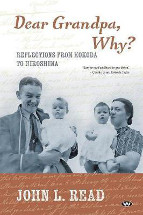Dear Grandpa, Why? Reflections from Kokoda to Hiroshima by John L. Read

Wakefield Press, 2018. ISBN 9781743055762
(Age: Senior secondary - Adult) Highly recommended. Non-fiction. The
cover shows John L. Read's grandfather Edward Mobsby and his wife
holding their year old twin daughters. It is this photograph that
sparks Read's curiosity as to what would make the father of adored
twin daughters sign up to fight a war in another country, flying
bomber aircraft over New Guinea jungle, and ultimately give his
life, shot down by the Japanese. Read's quest to understand the
motivation of the man in the photograph - obviously an elated and
proud father - leads him to retrace Mobs's steps and search out the
site of the plane wreckage and burial in New Guinea.
Read gradually comes to understand the gut-wrenching courage
required to fly the B52 planes repeatedly into enemy territory,
facing certain fire from the Japanese Zeros - and wants to know
whether the sacrifice was worth it. He is driven to research the
causes of the war in the Pacific, and questions whether we have
learnt from that time. We say 'Lest we forget' but it's not enough
just to remember the deaths and grieve, we want to make sure that we
don't repeat the same mistakes. Resource scarcity as a trigger for
war could easily occur again, and foreign aid has been cut despite
its significant role in reducing likelihood of regional conflict.
Australia seems set on a dangerous path.
In his quest for understanding, Read encounters a Japanese woman on
a similar undertaking, honouring her grandfather's death in the same
part of New Guinea. It is in Read's family's developing friendship
with Miyuki and the honest communication that they share that offers
the best hope for the future.
This compelling book is written from the heart, and easily draws the
reader in on the journey with Read seeking answers about his
grandfather's sacrifice. I recommend it to all readers, but
particularly students of World War II. It provides a personal
entry-point for understanding the events that led to the war in the
Pacific and raises many questions about what causes war and what we
should do in the future to prevent such terrible loss and waste of
life.
Helen Eddy